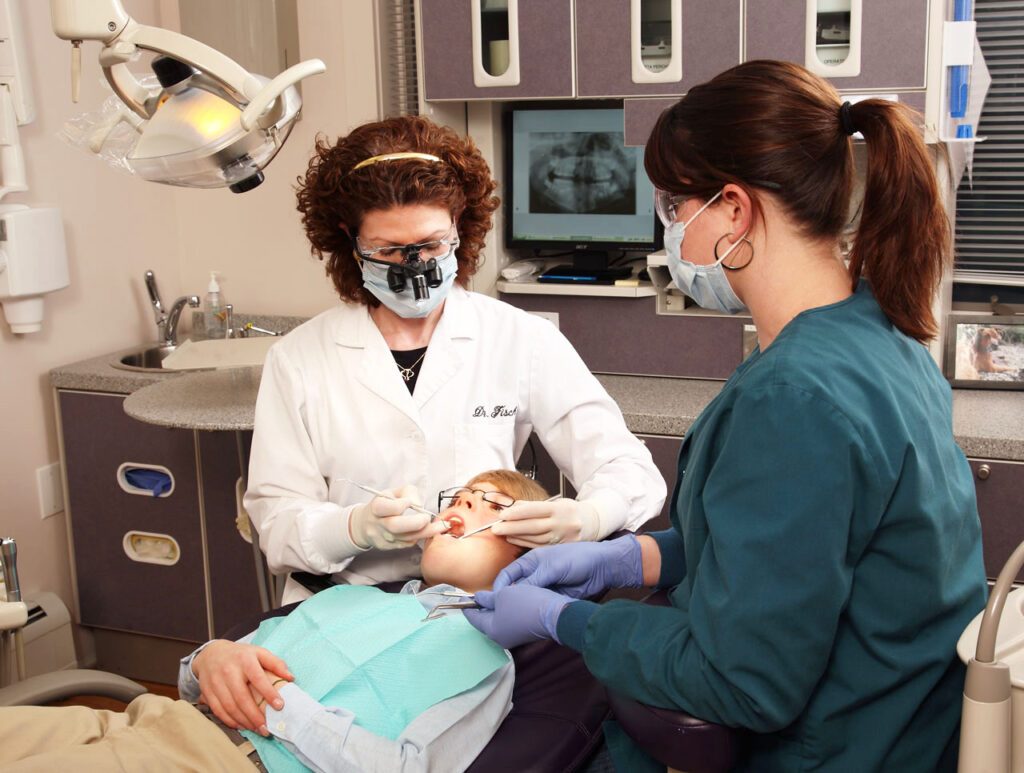Our Services > General Dentistry > Children’s Dentistry
Children’s Dentistry
Your child’s first “regular” dental visit should be just after their first birthday. This appointment is usually short and involves very little treatment.
We may ask you to sit in the dental chair and hold your child during the examination. For older children, you may be asked to wait in the reception area during part of the visit so that a relationship can be built between your child and your dentist.
What to expect for your child’s first visit?
We will gently examine your child’s teeth and gums. We may clean your child’s teeth and apply topical fluoride to help protect the teeth against decay. Most important of all, we will review with you how to clean and care for your child’s teeth.
Certainly, any treatment we recommend for the first visit is age appropriate.
What should I tell my child about the first dental visit?
We are asked this question many times. We suggest you prepare your child the same way you would before their first haircut or trip to the shoe store. Your child’s reaction to their first visit to the dentist may surprise you.
Here are some “First Visit” tips:
- Take your child for a “preview” of the office.
- Read books with them about going to the dentist.
- Review with them what the dentist will be doing at the time of the first visit.
- Speak positively about your own dental experiences.
During your first visit the dentist will:
- Examine your mouth, teeth and gums.
- Evaluate adverse habits like thumb sucking.
- Check to see if you need fluoride.
- Teach you about cleaning your teeth and gums.
- Suggest a schedule for regular dental visits.

What about preventive care?
Tooth decay and children no longer must go hand in hand. At our office we are most concerned with all aspects of preventive care. We use the latest in dental sealant technology to protect your child’s teeth. Dental sealants are a clear liquid plastic that is bonded to the chewing surfaces of permanent back teeth. This is just one of the ways we will set the foundation for your child’s lifetime of good oral health.
Cavity prevention
Most of the time cavities are due to a diet high in sugary foods and a lack of brushing. Limiting sugar intake and brushing regularly, of course, can help. Brushing morning and night is a must to help prevent decay. Let your child brush first, and then you can brush the more difficult areas to reach. Flossing is very important in children so that any food particles left between the teeth, are removed with the floss. This will help to decrease cavities forming between the teeth.
Tips for Cavity Prevention
- Limit frequency of meals and snacks.
- Avoid foods high in sugar content
- Encourage brushing, flossing and rinsing.
- Watch what your child drinks.
- Avoid giving your child sticky foods.
- Choose nutritious snacks.
- Brush & floss before going to sleep at night.
The first baby teeth that come into the mouth are the two bottom front teeth. You will notice this when your baby is about 6-8 months old. Next to follow will be the four upper front teeth and the remainder of your baby’s teeth will appear periodically. They will usually appear in pairs along the sides of the jaw until the child is about 2 1/2 years old.
At around 2 1/2 years old your child should have all 20 baby teeth. Between the ages of 5 and 6 the first permanent teeth will begin to erupt. Some of the permanent teeth replace baby teeth and some do not. Don’t worry if some teeth are a few months early or late, as all children are different.
Baby teeth are important: they not only hold space for permanent teeth, but they are important for chewing, biting, speech, and appearance. For this reason, it is important to maintain a healthy diet and daily hygiene.
Schedule Your Appointment
Call our office to learn more about our practice specialties and earliest available appointment dates.
Call us at (802) 775-5286 to schedule your appointment today!